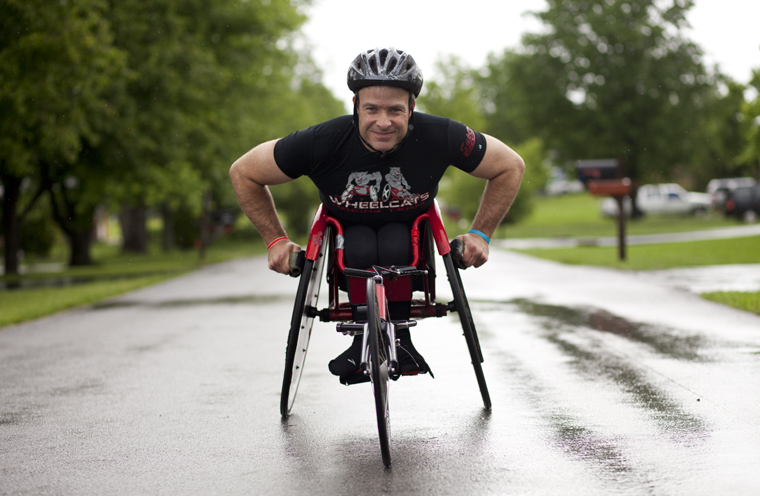Wheels of fortune: Student Disabilities coordinator races wheelchair internationally
May 3, 2011
Matt Davis, coordinator of Student Disability Services, helps students each day while they attend classes at WKU.
When he meets with students, Davis often says, “I’ve been where you are.”
Those words are not some therapeutic jargon or technique, but the truth.
In Downing University Center, the 44-year-old maneuvers around his office desk in a wheelchair.
“This is all I’ve ever known,” he said, as his hands move the wheels back and forth on his chair.
Davis was born with spina bifida, which is a disorder where some vertebrae overlying the spinal cord are not fully formed.
In 1997, when Davis was an undergraduate at WKU, he was also a recipient of services at Student Disabilities, and the result was one he said changed his life.
Huda Melky was assisting students with disabilities as an Affirmative Action/ADA compliance officer when Davis showed up in her office at WKU.
She now serves as the equal opportunity director and ADA coordinator for Equal Opportunity/Affirmative Action/University ADA Services for the university.
“I was going on lunchtime to do my run,” Melky said. “He asked what I was doing, and I said I was going for a run. He said, ‘I wish I could run,’ and that’s when I said, ‘You can.'”
Davis said he had seen wheelchair racing on television and told Melky he was interested in getting started in the sport.
“Huda is the kind of person that said, ‘OK, we’re going to do this,'” he said.
Melky recommended he begin at the Preston Center because of its accessibility for students with disabilities. While Davis started getting in shape, she worked on getting him his first racing chair.
“He was worried about how expensive it would be,” Melky said. “I told him, ‘I’ll take care of it.'”
Melky and others put together bake sales and pledges and raised enough money for Davis to race in a 10-kilometer race that Bowling Green was hosting.
She then sponsored him to race the Chicago Marathon in 1999, and Melky said “he took off from there.”
“I have to tell you, from that point he blossomed,” Melky said.
Since receiving his first racing chair, Davis has competed both nationally and internationally in wheelchair racing.
Posters of wheelchair racing in Japan, where he has raced on 10 separate occasions, line his office walls.
Two weeks ago on April 18, he finished 21st overall in the 2011 Boston Marathon wheelchair race with a time of 1:48:54.
His fellow Boston Marathon competitor in the men’s run, Jeff Stein, said knowing an athlete like Davis has inspired his own racing as well.
“He is a very good wheelchair racer and a real nice guy,” Stein said. “He’ll race Boston and will race the next weekend as well. It is remarkable. He was the 21st guy to cross the line at Boston, you know, out of 27,000. He’s that solid.”
After learning about Davis’ participation in racing, students have come to him asking how they can get involved as well, he said.
He has also struggled throughout his life with mathematics because of a learning disability that left him unable to comprehend and retain math concepts. Davis said this gives him an interesting perspective when working with students.
“I do have an understanding of those challenges,” Davis said. “Most of the students we serve have a hidden disability. It would be a disability that if you saw them on campus, you wouldn’t necessarily know that they had one. A lot of times that presents challenges for us and them. They don’t want to get help from us. Maybe because of a stigma they had in high school.
“It helps when I meet with a student and can say, ‘I’ve been where you are.’ I was a student here as an undergrad. I know how the Hill can be challenging.”
Serving as coordinator of Student Disability Services since 2001, Davis ensures the correct accommodations are made in the classroom and around the Hill for those in need.
“We try to help students bring down the Hill, so to speak,” he said.
It’s a cycle that Melky said she would like to see repeated over and over again.
“Students see that if he can make it, they can make it,” she said. “They can’t say, ‘I can’t do this because I have a disability.’ He did it with a disability.
“I’m just so proud of him. When you have a role model like Matt, you have so many students that can follow his footsteps.”













